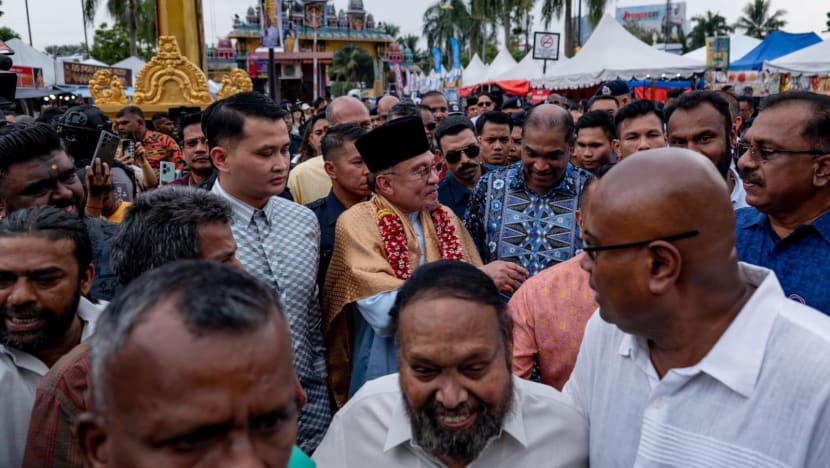Malaysia reverses controversial move to set guidelines for Muslims attending non-Muslim events
The U-turn by the Anwar Ibrahim administration has been criticised by some politicians but lauded by other groups.

Malaysia Prime Minister Anwar Ibrahim (centre) visiting Batu Caves on Feb 7, 2025 where he addressed questions on the government's earlier plan to introduce guidelines for Muslims attending non-Muslim events. (Photo: Facebook / Anwar Ibrahim)
KUALA LUMPUR: Malaysia’s government has reversed its decision to introduce controversial guidelines for Muslims attending non-Muslim events, with the U-turn criticised by some politicians but lauded by other groups.
Speaking to reporters on Friday (Feb 7), Prime Minister Anwar Ibrahim said the guidelines were unnecessary and would only cause public anxiety.
“I think there’s no need for such guidelines because Muslims know the rules (of our faith).
“This is the norm. Let’s not complicate things and cause anxiety in our society. This is what the Cabinet decided,” he was quoted as saying by news outlet Free Malaysia Today.
On Tuesday, Religious Affairs Minister Mohd Na’im Mokhtar said in a parliamentary reply that Malaysia’s Islamic Development Department (JAKIM) was finalising specific guidelines in relation to Muslims attending non-Muslim events or celebrations.
JAKIM is the federal government agency that administers Islamic affairs in Malaysia.
Under the proposed rules, among other things, there can be no songs or speeches with religious “propaganda” or performances that may insult Muslims.
Organisers of these events would also have to seek permission from relevant authorities and the views of Islamic agencies when inviting Muslims for events at a non-Muslim house of worship.
The guidelines also specified that event premises should not contain non-Islamic religious symbols.
The minister said that the guidelines are advisory in nature and were aimed at fostering "social and cultural" harmony among Malaysia’s multi-religious society.
But his announcement was slammed by many politicians and religious groups, though some defend the move.
Among other things, critics say the guidelines could threaten Malaysia’s religious harmony, while those in favour say the advisories were necessary to safeguard the faith of Muslims and maintain Islam’s position as the religion of the federation.
Following Friday’s Cabinet meeting, Na'im and National Unity Minister Aaron Ago Dagang issued a statement to say that JAKIM had proposed the guidelines following queries from Muslims on invitations to events organised by non-Muslims which may include religious elements.
"Given that this issue has sparked confusion among Malaysia's multi-racial and multi-religious population, the Cabinet has agreed that JAKIM can issue advice to Muslims on the need to preserve their faith,” the statement added.
"However, this advice does not constitute official policy.”
On Friday, Anwar was asked about the issue when he visited Batu Caves to check on preparations ahead of Thaipusam celebrations next Tuesday.
“Although Islam is the official religion of Malaysia, our country is multiracial and multireligious,” he said.
“If we want to ensure peace and harmony in this country, we must look after everyone.”
REACTIONS TO U-TURN
The government’s turnaround has been lauded by different groups.
Tan Hoe Chieow, president of the Malaysian Consultative Council of Buddhism, Christianity, Hinduism, Sikhism and Taoism, believes that the Cabinet decision seeks to maintain Malaysia’s religious harmony.
“That’s a very important decision by the Cabinet,” he added, as quoted by news outlet The Star.
Federation of Chinese Associations Malaysia (Huazong) president TC Goh said the proposed guidelines would have a significant impact on the non-Muslim community.
"Such proposals, especially those involving racial and religious sensitivities, should not be unilaterally announced by departments or agencies, as this risks public uproar," said Goh, as quoted by The Star.
He also urged ministers to base parliamentary responses on approved policies, particularly on sensitive matters, and criticised the practice of announcing policies before Cabinet approval, calling it procedurally inappropriate.
Responding to Anwar’s announcement, civil society group G25, made up of prominent retired Malay civil servants, said that it strongly opposes the development of any guidelines - advisory or not.
“They are unnecessary, impractical and counterproductive to national unity,” the Star quoted it as saying.
“Such guidelines will have implications on non-Muslim houses of worship organising social or cultural activities, risking fanning fears of overreach into non-Muslim religious affairs.
“Malaysians, including Muslims, are fully capable of exercising our own judgment.”
However, some politicians on both sides of the aisle have questioned the government’s U-turn.
Akmal Saleh, youth chief of the United Malays National Organisation which is part of the ruling coalition, disagreed with Anwar that the guidelines are unnecessary.
“These guidelines are meant as a reference, not because people are ignorant, but because sometimes we forget, and this serves as a reminder,” he said in a Facebook post.
He added that when it comes to guidelines which apply only to Muslims, there is no need for non-Muslims to be involved.
“Simple as that.”
Similarly, youth chief of opposition party Parti Islam Se-Malaysia (PAS) Afnan Hamimi Taib Azamudden has questioned the government’s flip-flop, saying that it raises concerns over the government’s commitment to upholding the National Fatwa Council’s decisions as well as Islam’s position as the religion of the federation.
“PAS Youth believes that Islam, as the religion of the federation, must be fully respected in all government policies and actions,” he said in a statement, as reported by news platform Malaysiakini.
“We urge that this issue be given serious attention to ensure the sovereignty of Islam is preserved while maintaining national harmony.”















